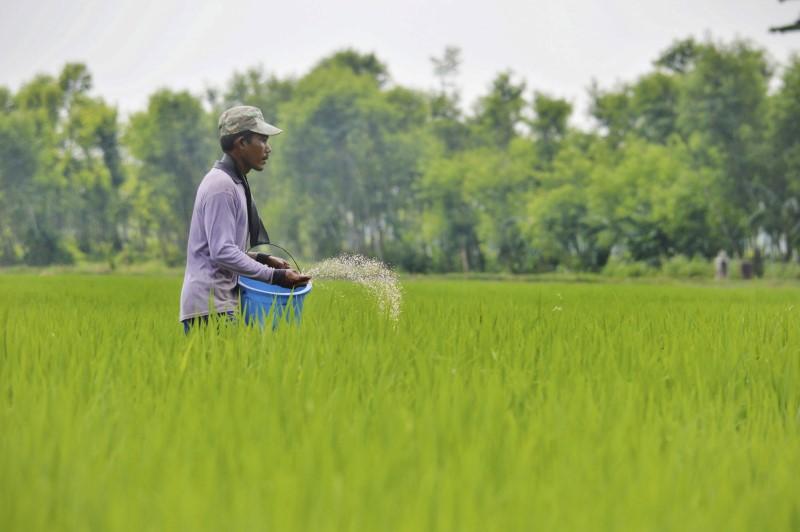MANILA, April 1 (Reuters) - More than half of the 1.3
million tonnes of rice import orders by the Philippines' traders
for 2020 are yet to be delivered, the country's farm minister
said on Wednesday, even as he sought to allay concerns over
supply of the staple food.
Agriculture Secretary William Dar said around 700,000 tonnes
of rice cargoes purchased by private players have not been
delivered yet, although he made fresh assurance that supply in
the world's biggest buyer of the grain remains adequate.
The Philippine authorities have repeatedly sought to ease
Filipinos' concerns about a tightening of domestic rice supply
at a time when many parts of the country have been locked down
to contain the spread of the coronavirus.
The pandemic has sparked global food security concerns, with
some rice producers in Asia imposing rice export bans and others
going into lockdown to battle the outbreak.
Dar said a plan by the government to import 300,000 tonnes
of rice is a "contingency measure" that will help keep domestic
supply sufficient and prices in check while the
coronavirus-containment measures are in place. The Philippines became the world's biggest rice importer in
2019 after it scrapped purchase caps, buying a record 2.9
million tonnes. Vietnam and Thailand are its main suppliers.
Dar said the Philippines is counting on its Southeast Asian
neighbours, including Myanmar, for help to boost its rice
stocks, as he encouraged local traders to bring in more grains.
Vietnam, the world's third-largest rice exporter, has
temporarily suspended new rice export contracts while
undertaking a review of its stockpile to ensure it has enough
domestic supplies to cope with the coronavirus outbreak.
Thailand, the world's second-largest rice exporter after
India, however, remains open for new deals and is bracing for
increased sales while its competitors are enforcing a ban or
limit on sales. Last week, Dar said the country has enough rice for the next
four months, taking into account current state stockpile, the
incoming local dry-season harvest, and continued imports.
- English (USA)
- English (UK)
- English (India)
- English (Canada)
- English (Australia)
- English (South Africa)
- English (Nigeria)
- Deutsch
- Español (España)
- Español (México)
- Français
- Italiano
- Nederlands
- Português (Portugal)
- Polski
- Português (Brasil)
- Русский
- Türkçe
- العربية
- Ελληνικά
- Svenska
- Suomi
- עברית
- 日本語
- 한국어
- 简体中文
- 繁體中文
- Bahasa Indonesia
- Bahasa Melayu
- ไทย
- Tiếng Việt
- हिंदी
More than half of Philippines' 2020 rice import orders yet to be delivered - minister
Published 04/01/2020, 02:28 PM
Updated 04/01/2020, 02:30 PM
More than half of Philippines' 2020 rice import orders yet to be delivered - minister

Latest comments
Install Our App
Risk Disclosure: Trading in financial instruments and/or cryptocurrencies involves high risks including the risk of losing some, or all, of your investment amount, and may not be suitable for all investors. Prices of cryptocurrencies are extremely volatile and may be affected by external factors such as financial, regulatory or political events. Trading on margin increases the financial risks.
Before deciding to trade in financial instrument or cryptocurrencies you should be fully informed of the risks and costs associated with trading the financial markets, carefully consider your investment objectives, level of experience, and risk appetite, and seek professional advice where needed.
Fusion Media would like to remind you that the data contained in this website is not necessarily real-time nor accurate. The data and prices on the website are not necessarily provided by any market or exchange, but may be provided by market makers, and so prices may not be accurate and may differ from the actual price at any given market, meaning prices are indicative and not appropriate for trading purposes. Fusion Media and any provider of the data contained in this website will not accept liability for any loss or damage as a result of your trading, or your reliance on the information contained within this website.
It is prohibited to use, store, reproduce, display, modify, transmit or distribute the data contained in this website without the explicit prior written permission of Fusion Media and/or the data provider. All intellectual property rights are reserved by the providers and/or the exchange providing the data contained in this website.
Fusion Media may be compensated by the advertisers that appear on the website, based on your interaction with the advertisements or advertisers.
Before deciding to trade in financial instrument or cryptocurrencies you should be fully informed of the risks and costs associated with trading the financial markets, carefully consider your investment objectives, level of experience, and risk appetite, and seek professional advice where needed.
Fusion Media would like to remind you that the data contained in this website is not necessarily real-time nor accurate. The data and prices on the website are not necessarily provided by any market or exchange, but may be provided by market makers, and so prices may not be accurate and may differ from the actual price at any given market, meaning prices are indicative and not appropriate for trading purposes. Fusion Media and any provider of the data contained in this website will not accept liability for any loss or damage as a result of your trading, or your reliance on the information contained within this website.
It is prohibited to use, store, reproduce, display, modify, transmit or distribute the data contained in this website without the explicit prior written permission of Fusion Media and/or the data provider. All intellectual property rights are reserved by the providers and/or the exchange providing the data contained in this website.
Fusion Media may be compensated by the advertisers that appear on the website, based on your interaction with the advertisements or advertisers.
© 2007-2024 - Fusion Media Limited. All Rights Reserved.